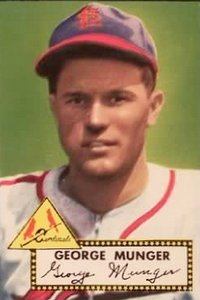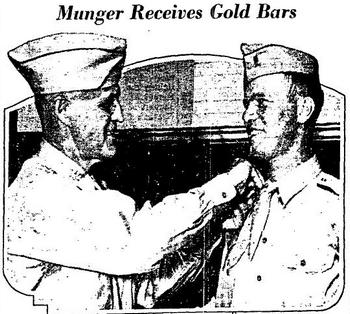

|
|
Red Munger
Date and Place of Birth: October 4, 1918 Houston, Texas
Died: July 23, 1996 Houston, Texas
Baseball
Experience:
Major League
Position: Pitcher
Rank: First Lieutenant
Military Unit: Third Army US Army
Area Served: European Theater of Operations
Houston
sent the youngster to New Iberia of the Evangeline League where he
had an excellent rookie season, and split 1938 between New Iberia
and Houston.
Munger
pitched for Springfield in 1939, and was with the Sacramento Senators
of the Pacific Coast League in 1940 and 1941.
Munger
made his major league debut with the St Louis Cardinals on May 1,
1943. He made 39 appearances for the Cardinals that year for a 9-5
record and 3.95 ERA.
Munger got
off to an incredible start in 1944. As the all-star game approached
he was 11-3 with a diminutive 1.34 ERA.
The 6-foot
2-inch, 25-year-old was selected for the all-star game but at the
same time was selected for military service, entering on July 11,
1944. He was initially at Jefferson Barracks in St Louis, before
moving to Camp Roberts, California, where he quickly rose to squad
leader. After 17 weeks at Camp Roberts, Munger was shipped to Fort
Benning, Georgia. On April 14, 1945, he was commissioned a second
lieutenant after graduating from Officers Candidate School and
served at the base prison camp.
In May
1945, Munger opened the baseball season for the Third Student
Training Regiment Rifles at Fort Benning with a three hit, 5 to 0
win, striking out 13. On June 4, he set an Infantry School League
record by striking out 16 in a 4-0 victory over the Columbus Foxes.
It was his sixth win and fourth shutout of the season, allowing only
one earned run in 58 and one-third innings. In September he struck
out a further 15 and slammed a 375-foot home run in a 3-0 win over
the Academy Regiment Profs. He finished the season with 14 wins and
two losses.
In late September 1945, while on leave from Fort Benning, Munger
pitched for Finger Furniture in the Houston Post semi-pro
tournament, being defeated in the finals by Ellington Field.
Towards the end of 1945, Munger was sent overseas to Europe. He was
stationed in Germany. “I spent my entire seven months in Germany in
Heidelberg,” Munger told The Sporting News on September 4,
1946. “I was … in charge of the athletic program of the Third Army.
Nearly all the GIs over there are kids between 18 and 20, who never
had it so good in their lives.
“We had four leagues of six clubs each, and I played 38 games this
summer. But I pitched in only half a dozen. The reason was this: We
had no standout ball players. Just high school boys, some
sandlotters. It would have been unfair, and certainly no fun for me,
to have pitched against that type of hitter. The class of ball which
we dished up in those four leagues, which were about on a par, may
be appreciated from the fact that I hit .640. There was no real
pitching. Just fast stuff, no curves, little pro hurling.
“Had I
kept to pitching, there would have been no competition. As it was,
my club, Third Army Headquarters, had won 30 straight when I left.
It had taken 36 out of 38.
“In addition to the Third Army League, there were the First, Third
and Ninth Division loops. We had a split season and our club won
both halves. The only other pros in the four circuits were Cal
McLish, the Dodger pitcher … and Carl Scheib, hurler for the
Athletics, who still is over there with the 60th Infantry
Devildogs.
In late July 1946, Munger returned to the United States. His return
to the Cardinals was eagerly awaited but after two years away he
lacked the stamina and control and seemed to possess in abundance
before military service.
He made two appearances to finish out the 1946 season, with a 2-2
won-loss record and 3.33 ERA. He was back in fine form in 1947,
winning 16 games (including six shutouts) against just five losses.
But that was to be his best season. Munger did manage 15 wins in
1949, but by 1952 it was all over apart from a brief comeback with
the Pirates in 1956.
After he retired as a player, Munger worked as a minor league
pitching coach and worked as a private investigator with the
Pinkerton Detective Agency in Houston during the off-season.
Red Munger passed away in his hometown of Houston on July 23, 1996.
He was 77 years old.
Created May 26, 2007.
Copyright © 2008 Gary Bedingfield (Baseball
in Wartime). All Rights Reserved.


April 14,
1945. Munger receives the gold bars of a second
lieutenant at Fort Benning, Georgia., from Colonel
William B Yancey, commanding officer of the Third
Student Training Regiment.
Click Here to Review
Red Munger's Stats on
Baseball Almanac
“Where what happened
yesterday is being preserved today.”